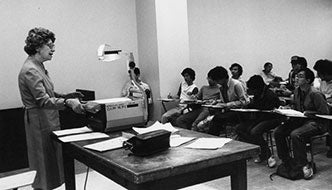The start of March marks Women’s History Month and is a fitting time to recognize the contributions of the many women who have shaped the institution—including President Shirley Ann Jackson, the Institute’s first female president, and Lois Graham ’46 and Mary Ellen Rathbun ’46, the first women to graduate from Rensselaer.

Marie de Pierpont
Perhaps less well-known, but no less worthy, are three women who, over the course of about 50 years, broke ground as the first female professors at Rensselaer: Marie de Pierpont, Herta Leng, and Edith Luchins.
The Institute’s first female professor, Marie de Pierpont, was far ahead of her time. She was named a full professor of French and head of the Department of Foreign Languages in 1929; it would be nearly 40 years before another woman held the same title.
De Pierpont’s husband, Arthur de Pierpont, taught French at Rensselaer and later was the head of the Foreign Language Department. In 1919, Marie de Pierpont was appointed an instructor of French and for nearly a decade the couple worked side-by-side. They were the first husband-and-wife team of professors at Rensselaer.
In 1929, Arthur de Pierpont’s failing health forced him to retire and Marie took over his role as French professor and department head until the department was disbanded in 1932.

Herta Lang
Another woman, Hazel Brennan, was hired as an instructor in chemistry just before Marie de Pierpont was hired, in late 1918. She was “the first of her sex to teach at Rensselaer,” The Polytechnic noted in December 1918. Brennan was never promoted to professor, however.
Eleven years after de Pierpont left Rensselaer, Herta Leng joined the Rensselaer faculty. Leng was a nuclear physicist who fled her native Austria in 1939. She worked in the physics departments at Purdue University, Dana Hall School in Wellesley, Mass., and Hunter College in New York. In 1943 she was hired by Rensselaer, where she continued her research into radioactive materials and was promoted to full professor in 1966.
In 1962, Edith Luchins was hired to work in the mathematics department. Eight years later, in 1970, she became the third woman to be appointed a full professor in the Institute’s history.

Edith Luchins
Eight years later, in 1978, one of Luchins’ colleagues in the Chemistry Department, Sonja Krause ’54, was appointed a full professor. Krause worked at the Institute until 2004.
Throughout her long career at Rensselaer, Luchins received many honors for her work with students, but she left another lasting legacy in her passionate advocacy for women and girls studying math.
In the early 1980s, Luchins was incensed by a study indicating that boys possessed more innate mathematical ability than girls. The study’s release generated headlines like “Do Males Have a Math Gene?” in Newsweek and “The Gender Factor In Math: A New Study Says Males May Be Naturally Abler Than Females” in Time.
Edith Luchins wrote editorials and letters to the editor fighting back against the study’s assertion that girls have less innate math ability.”
Luchins and her husband, Abraham Luchins, a psychology professor at SUNY Albany, conducted their own study, questioning hundreds of male and female mathematicians about their formative experiences with math. They found the women were far more likely to report that they had been actively discouraged from pursuing a career in math by teachers, guidance counselors, and family members.
Edith Luchins wrote editorials and letters to the editor fighting back against the study’s assertion that girls have less innate math ability.
The Luchins’ conclusion was that any performance gap between male and female students in mathematics was the result of active discouragement of girls, not any lack of innate ability.
“The Benbow-Stanley study, and the controversy it has generated, is reminiscent of the fruitless nature/nurture controversy over I.Q.,” Luchins wrote in the May 27, 1981, edition of the Christian Science Monitor. “It has the same ideological ramifications, except that now we compare the differences in scores between sexes rather than races. If we harness some of the energy now being expended in arguments over the nature and source of mathematical ability, we might improve mathematical learning for both sexes.”
Luchins also did hands-on work with local school districts, including South Colonie, Troy, and the Emma Willard School, to improve math, science, and technology education for students.
“We need to improve the methods of teaching mathematics—not only to produce mathematicians, but to increase the level of mathematical thinking, computational skills, problem-solving, and spatial ability in a broader segment of the population,” Luchins wrote in 1981.
More than 30 years later, her words seem prescient as educators continue their efforts to improve science, technology, engineering, and math education for students.
Special thanks to the staff of the Rensselaer Archives for their assistance with research for this piece.



